7.6 million. 609,000. And those numbers only tell part of the story.
Those two numbers, with a lot of digits in them, quantify just how far Catholic Human Services of the Archdiocese of Philadelphia and its three agencies went in serving people in need according to its latest report, which encompasses July 2021 through June 2022.
The first number shows how often Catholic Social Services, Catholic Housing and Community Services, and Nutritional Development Services programs fed, housed, and helped people of all faiths in countless others ways over that time.
The second number shows the incredible number of people those caring arms of the Archdiocese touched, equivalent to about 14% of the entire population of the Archdiocese’s five-county area, or 39% of the City of Philadelphia’s population.
“It is staggering, day in and day out,” said Auxiliary Bishop John J. McIntyre, who oversees the Secretariat for Catholic Human Services as part of his administrative and pastoral responsibilities, and serves as president of Catholic Social Services Board of Directors.
“Various people have told us it’s the church’s, or the Archdiocese’s, best kept secret. What Catholic Social Services does, it’s often not well known.”
People may not realize the size and breadth of the Archdiocese’s social service efforts. Yes, it spans the millions of meals through the Community Food Program and federally-funded Child Nutrition Programs. But it also encompasses donated groceries, baby care, and feminine hygiene products.
Even more, it spreads across acts of bridging gaps of shelter scarcity – from newly stable affordable housing to rent and mortgage assistance – and acts on the journey to healing, from in-home services for at-risk youth to pregnancy and parenting services.
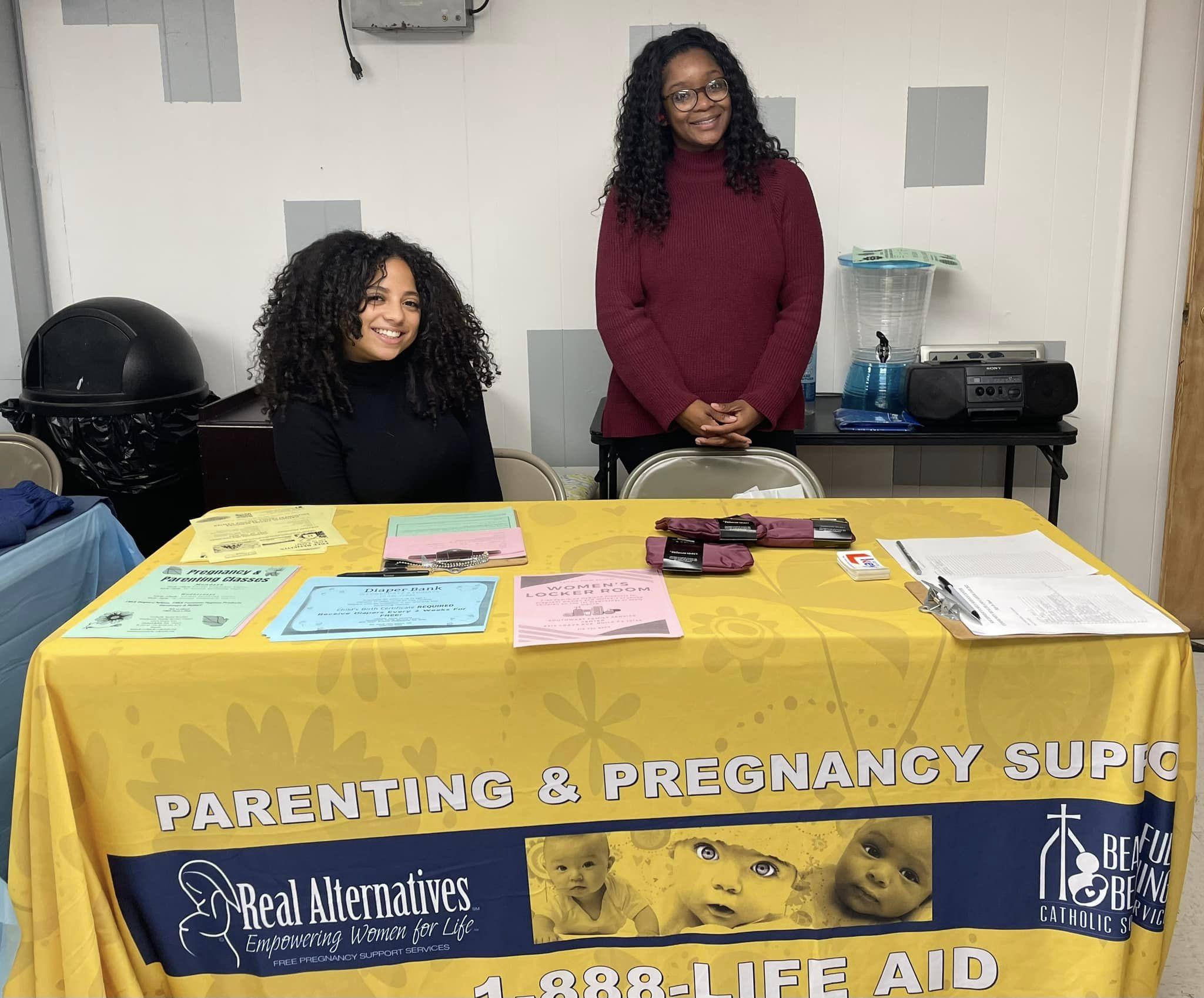
Catholic Social Services’ staff distribute information to the community on parenting and pregnancy support services available through the agency. Some 6,405 clients received services in 2022. (Photo: Southwest Family Service Center)
Yet the most staggering aspect of what Catholic Human Services has accomplished in recent years may not even be the quantity of the works, but just how immense – and sometimes dangerous – the task was to make those acts of compassion happen in the midst of the COVID-19 pandemic.
“Whether that was our intellectual disabilities programs, our homeless programs, our at risk youth, or our senior programs, staff remained committed to providing care and services to the most vulnerable in our communities.” said Secretary for Catholic Human Services Jim Amato. “Mission remained alive on a daily basis.”
Amato said the sheer size of Catholic Human Services lends itself to a broad skill and experience set for its staff and volunteers, allowing them to be agile and mobile in pivoting with innovative methods of compassion during the pandemic.
“The swiftness of Nutritional Development Services in ensuring that communities impacted by the pandemic and facing food-insecurity had access to food was critical. People knew they [Nutritional Development Services] were there and they knew they responded,” said Amato. “Drivers increased their workloads, [staff] made sure that folks including seniors had food. Staff visited recreation centers and met with children and youth to provide food.”
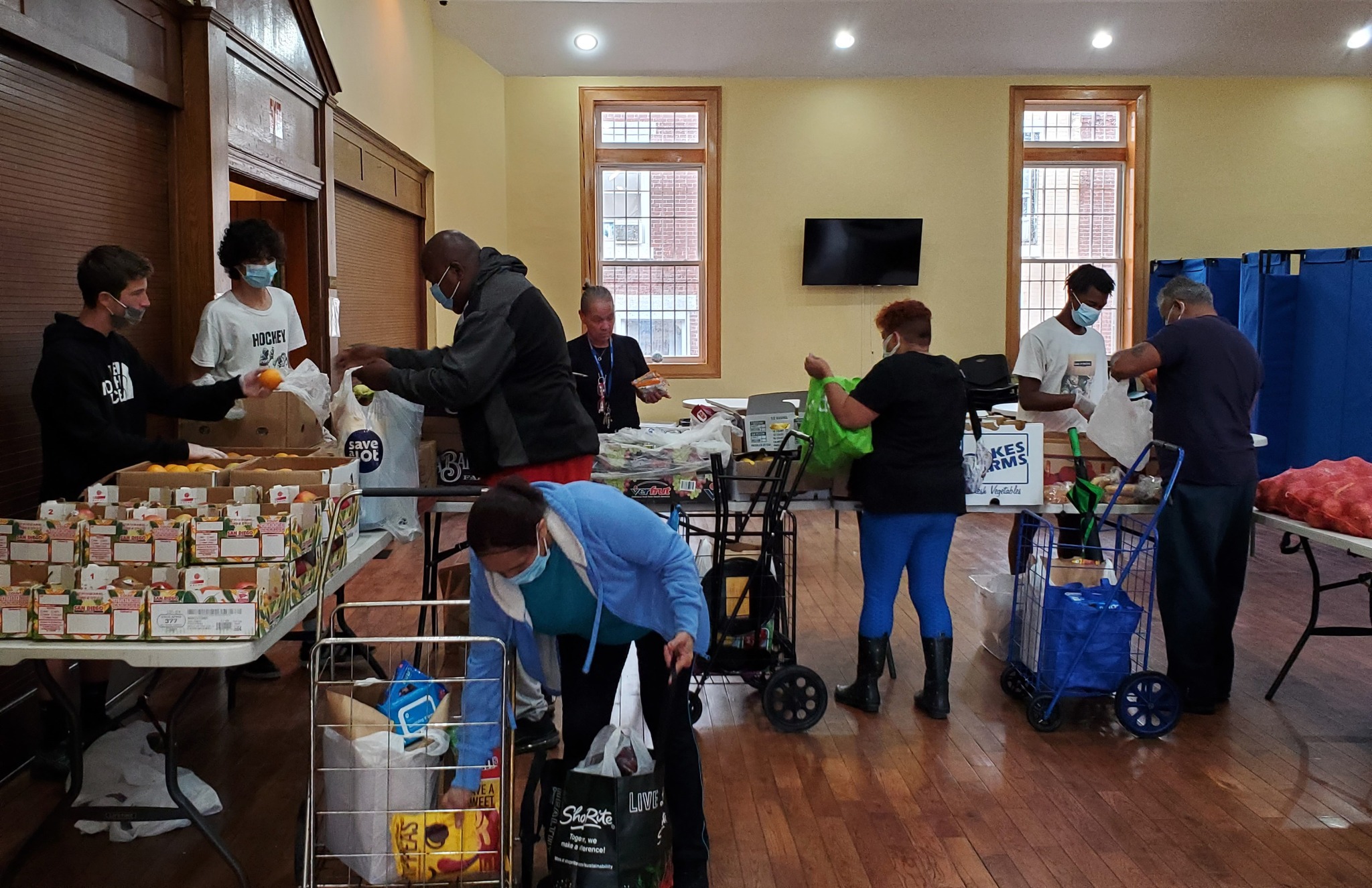
Nutritional Development Services sponsors a produce giveaway in 2022 at Mother of Mercy House and the Sisters of St. Joseph Welcome Center in Kensington, Philadelphia. The agency offers additional support to communities where accessing fresh food can be difficult. (Photo: Nutritional Development Services)
As the pandemic has evolved, and its economic effects have further destabilized many families through the challenges of inflation, those families have experienced a dramatic rise in food insecurity – another need the Archdiocese has continually answered.
“The poor are living right on the edge in terms of trying to provide for themselves and their families and the rising cost of food can be a real deal breaker,” Bishop McIntyre said. “We’ve increased our hunger-relief outreach in the sense we have opened new centers and increased our support of parish-based food pantries…we’ve increased our outreach at centers run by Catholic Social Services and extended our aid outreach to help smaller sites because the demand is greater for them.”
Those programs also include the evolving work of Martha’s Choice Marketplace, making the Archdiocese the largest food resource center in Montgomery County, along with the millions of meals Nutritional Development Services and the Archdiocese in general offers on a yearly basis.
“For so many of them [staff], it’s not only a job, but it’s a calling. It’s a vocation,” Bishop McIntyre added. “They’re mission driven. So that really, I think, motivated them to just keep things going. They know the great needs that are out there. They know that if we were, for example during the COVID shutdown, to just stop, pull back, there would be people who would go without meals, without food, without so many other services that we provide. So, they really did pivot and adjust.”
The Archdiocese also adjusted its footprint of caring presence to help international evacuees who came to Philadelphia in recent years, including those escaping Afghanistan and Ukraine, Amato said.
“They were running from terror. They were running from violence, and they were coming here, not only from crisis, but really with nothing,” he explained, adding that Catholic Human Services has often halted, then restarted its refugee resettlement work on demand as international events warrant.
“We were called to jump start our refugee resettlement program by United States Catholic Conference of Bishops,” Amato said. “We had kept several staff who had been doing refugee work the two years prior, and were doing other work when the Afghanistan evacuees were on their way to the United States. We were well positioned to say yes and fortunate to have experienced staff ready to immediately respond.”
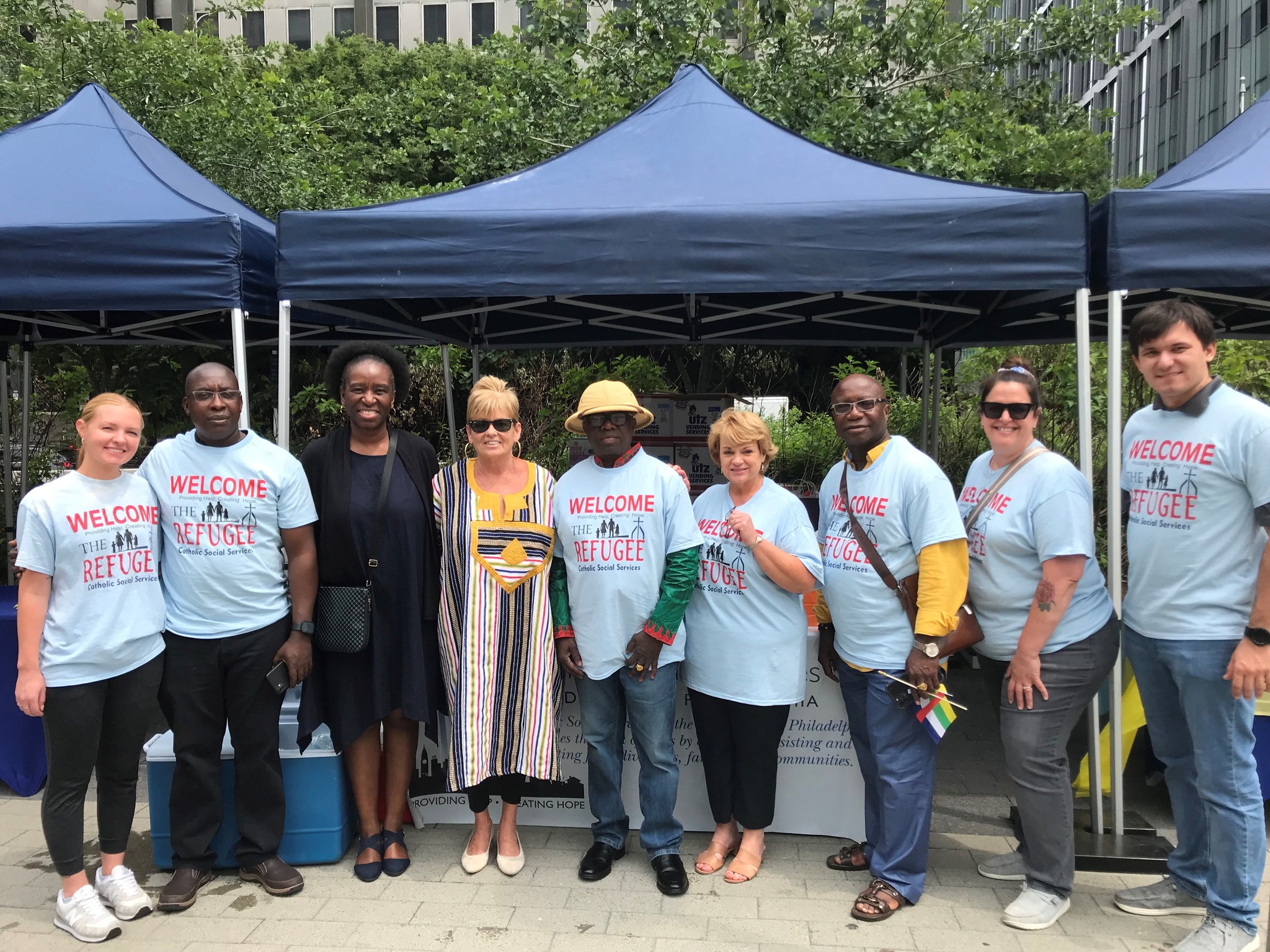
Catholic Social Services staff celebrate World Refugee Day June 20 at Love Park in Center City, Philadelphia. The agency provides assistance to newcomers arriving to the United States and to the Philadelphia region. (Photo: Catholic Social Services)
That work evolved into assisting evacuees with securing housing, enrolling their children in schools, and providing adults with job training utilizing numerous arms of Catholic Human Services.
“You don’t hesitate to do this work especially after being at it for 225 years,” said Amato. “That long and local legacy of work gets into your bloodline.”
This longstanding part of Philadelphia’s Catholic presence has also dived into innovative ways of serving those in need, including cutting-edge methods of being present to the journeys of youth in schools like Casa Del Carmen Preschool Academy in Hunting Park with the Spark School-Based Art Therapy. Their work is designed to offer expression without need for words, and give these young children tools for mindfulness.
Bishop McIntyre and Amato both agree that each of these programs, along with the longtime work of stalwart programs like St. John’s Hospice, depends on the time, talent and treasure of countless partners in mission – and the next-level commitment from the more than 1.5 million Catholics in the Archdiocese – in order to keep their ministries growing and able to pivot to ever-evolving needs.
“It’s just all those types of things that go on, day in and day out, without anybody blinking,” Bishop McIntyre said. “It’s just part and parcel of the life of the Church.”
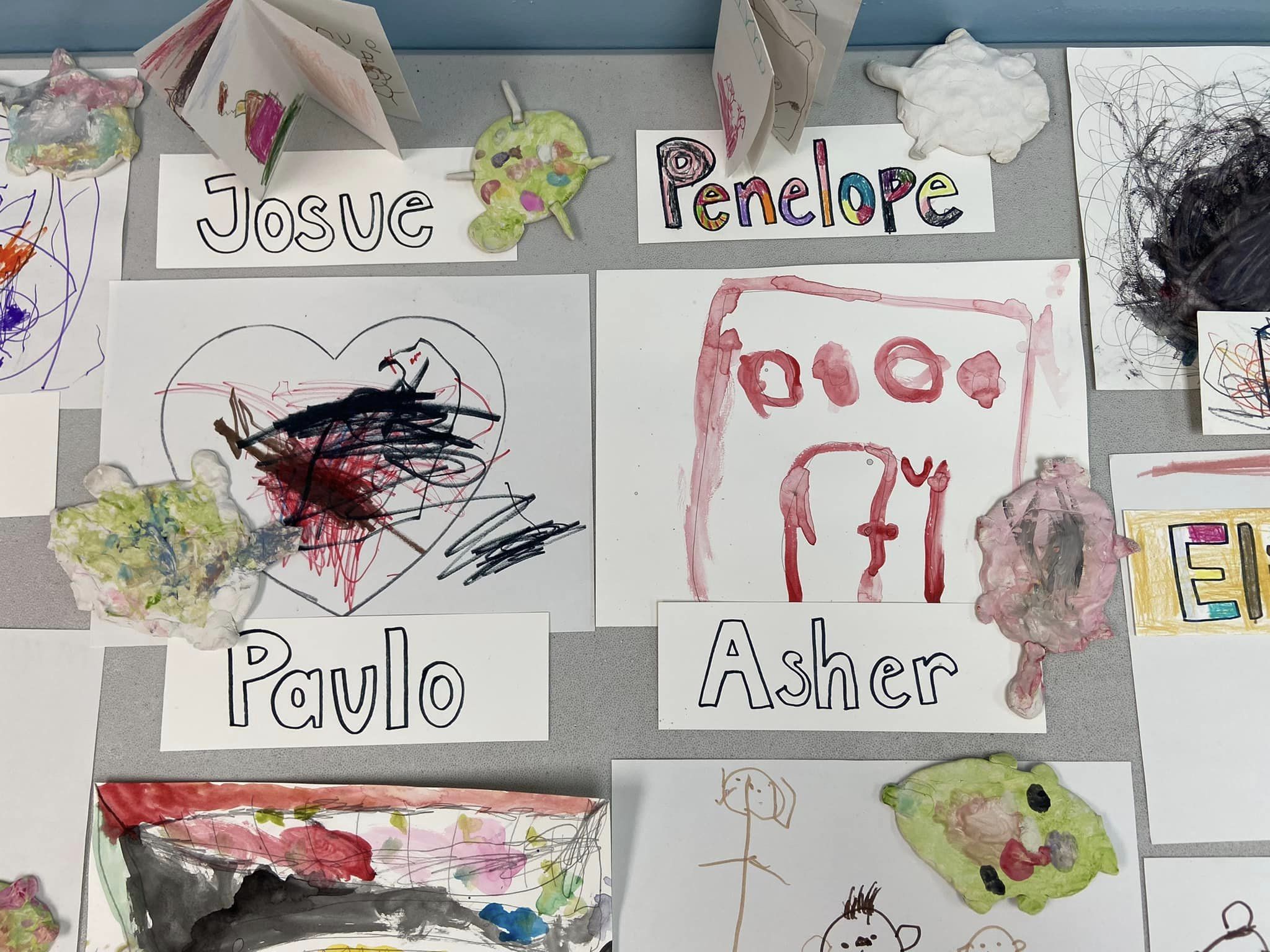
Casa del Carmen Preschool Academy launched Spark School-Based Art Therapy in 2021. With the aid of an art therapist, students have the opportunity to express themselves without words through child-centered art therapies. The program also aims to bridge the gap in clinical service delivery for students and families who may not otherwise have access to such services. (Photo: Casa del Carmen Preschool Academy)
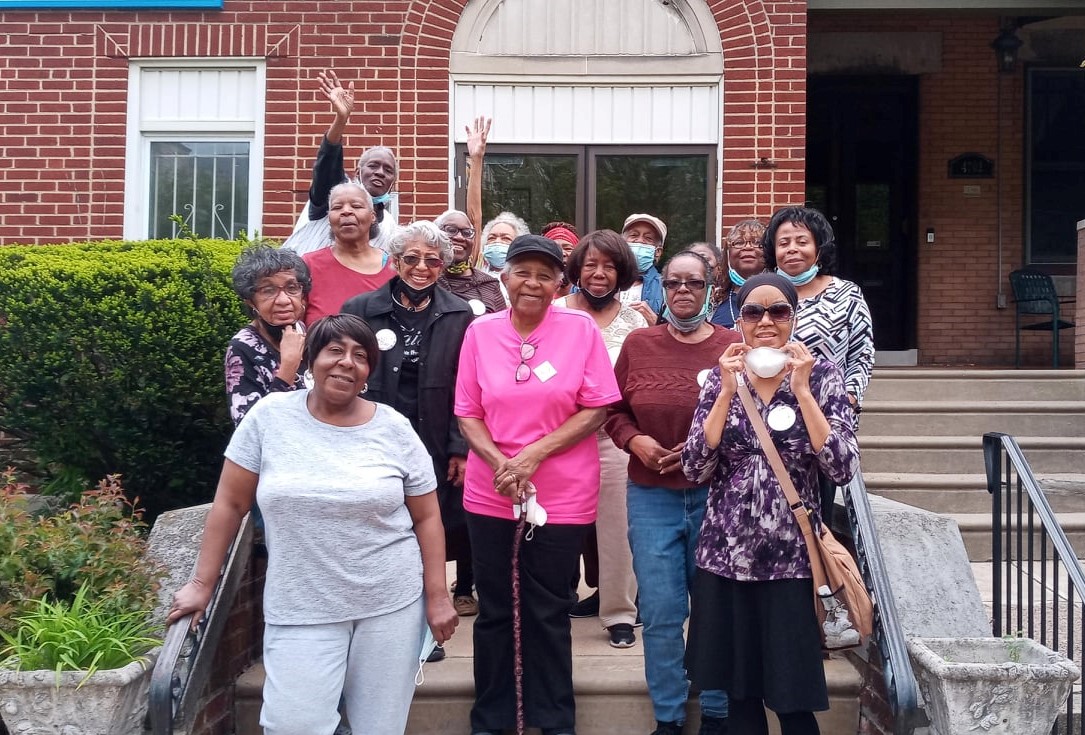
In this May 2022 photo, older adults at Catholic Housing and Community Services’ Star Harbor Senior Center in Southwest Philadelphia celebrate Older American’s Month. Over 2,800 seniors were served in senior centers and parish programs through the agency last year. The sites offer opportunities for socialization, recreation, physical exercise, education, and nutritional support with a focus on overall health, wellness and independence . (Photo: Star Harbor Senior Center)
PREVIOUS: Priest Serving Black Catholics for 60 Years Retires at Age 86
NEXT: Pope Francis Commissions 10 New Missionaries of Mercy for the Archdiocese of Philadelphia



Share this story